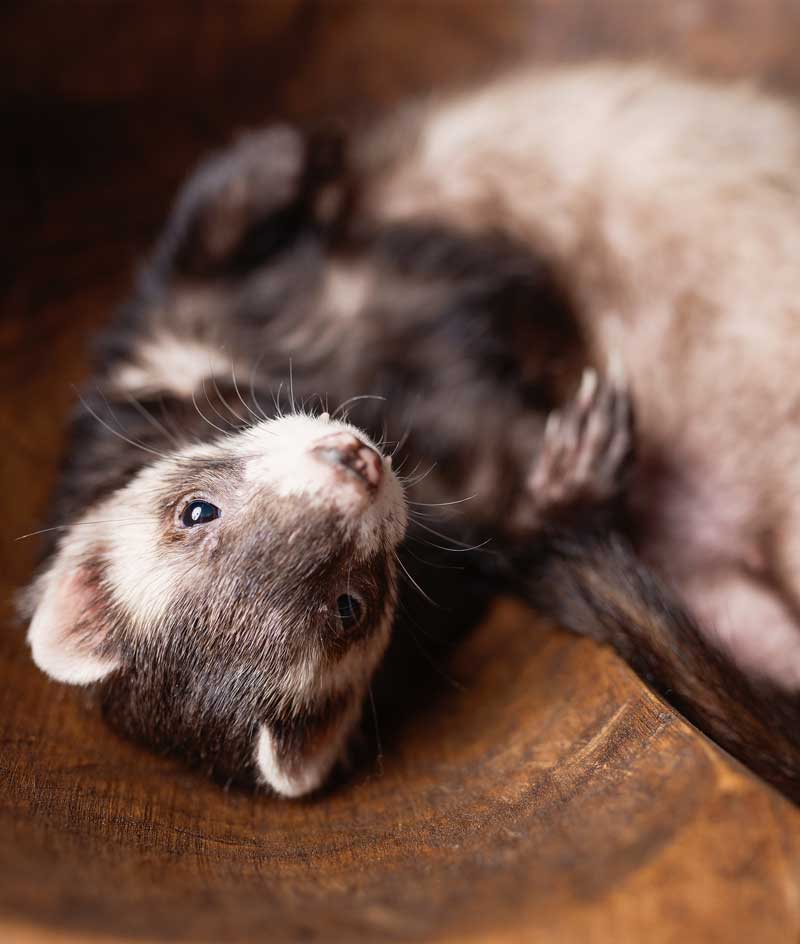Pet Ferret Care
Ferrets are inquisitive and playful, a popular pet for many reasons. They do require more care than many people expect, but they provide hours of entertaining antics.
A healthy ferret should be alert, inquisitive, full of energy, and bright eyed. All ferrets are carnivores and have a high metabolic rate. They should be fed one of the many balanced commercial ferret foods which contain at least 35% protein and always have fresh water available. Whole prey such as mice can be part of a naturally balanced diet as well.
Ferrets will often be willing to eat a variety of human table food, but these can sometimes upset the intestinal tract and are not recommended. Many treats that are marketed for ferrets are too high in simple sugars and carbohydrates and can cause health problems.
Most ferrets have already been spayed or neutered and de-scented before reaching the pet store. Some odor will remain even after de-scenting, and bathing regularly with a non-medicated shampoo for ferrets or kittens will help reduce this normal odor.
Unspayed female ferrets will not go out of heat unless they are bred or given a hormone injection by your veterinarian. If they stay in heat for extended periods, they can develop life-threatening anemia (low blood count). Therefore, if you do not plan to breed your female ferret, she should be spayed.
Vaccines will help protect your ferret from several potentially fatal illnesses. Canine Distemper vaccine starts at 8-10 weeks of age and again at 14-16 weeks of age. Signs of illness with distemper include eye discharge, diarrhea, nasal discharge, and respiratory infection, with eventual seizures and death. **There are currently no Canine Distemper vaccines available nationwide from the manufacturer that is licensed for use in ferrets due to problems in manufacturing.** The initial Rabies vaccine is given at 14-16 weeks of age. Vaccinations for Canine Distemper and Rabies should be boostered every year.
Ferrets can get the influenza virus from people as well as pass it back to humans. However, there is no flu vaccine for ferrets. Symptoms can be similar to early distemper infection, but they will recover with supportive care.
At the yearly physical exam, a stool (feces) sample should be tested for internal parasites. Ear mites or fleas are also common, but are usually easy to treat with the right medications. Blood testing may be helpful to monitor organ functions, especially in ferrets older than 3 years of age.
Seasonal hormonal changes in ferrets predispose them to adrenal tumors. Recent research has shown that controlling this hormone level at the appropriate time will reduce your ferret's chance of developing this common disease. Male ferrets should get this simple injection treatment in late December or January, while females are scheduled for February or early March.
Ferrets are curious animals and will get into anything and everything. Ferrets love to hide in small spaces, so you should block off tiny spaces they can squeeze into. They are especially fond of eating rubber and foam items, causing intestinal blockage. Common signs of this are lack of appetite, grinding the teeth, and lethargy. It is best to keep them confined to a large cage when not strictly supervised by an adult.
By following these simple guidelines regarding proper health care and supervision, your ferret will be an entertaining part of the family for a long time.
By Hillary Frank, DVM, Dipl. ABVP (Avian)
Hillary Frank, DVM, Dipl. ABVP (Avian) is a veterinarian at North Central Animal Hospital. She can be reached at (602) 395-9773. This article is provided as general information only. For specific advice on your pet's health, call us for an appointment or consult your veterinarian.

